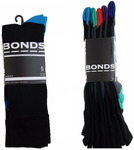Hi All
We have Mens Bonds Bamboo Socks on Sale. These are sent with free post using Australia Post.
No Coupon Code required. Just add them to your cart to see the special discount. - no minimum spend.
To redeem the 20 pair special, add another 10 pairs to your cart.
Sizes 6-10 and 11-14 Available.
We have 3 Colours :
Black 1:
https://zasel.com.au/products/10-pack-business-socks-bonds-m…
Black 2:
https://zasel.com.au/products/10-pairs-x-mens-bonds-business…
Multi:
https://zasel.com.au/products/10-pairs-x-mens-bonds-business…
Bonds Retail for 5 pairs is $27.99 + Shipping ( https://www.bonds.com.au/bamboo-crew-5-pack-assorted-01-szfq…)


How thick are the soles? Would they suit work boots?